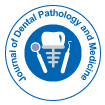Наша группа организует более 3000 глобальных конференций Ежегодные мероприятия в США, Европе и США. Азия при поддержке еще 1000 научных обществ и публикует более 700 Открытого доступа Журналы, в которых представлены более 50 000 выдающихся деятелей, авторитетных учёных, входящих в редколлегии.
Журналы открытого доступа набирают больше читателей и цитируемости
700 журналов и 15 000 000 читателей Каждый журнал получает более 25 000 читателей
Индексировано в
- Google Scholar
- ICMJE
Полезные ссылки
Журналы открытого доступа
Поделиться этой страницей
Абстрактный
Oral Care Resilience in the Face of a Pandemic: Impact on Depression and Burning Mouth Syndrome
Paul Harris
The COVID-19 pandemic has posed unprecedented challenges to individuals' physical and mental well-being, shedding light on the intricate connections between oral care, depression, and Burning Mouth Syndrome (BMS). This abstract explores the profound implications of oral care resilience in the context of a pandemic and its direct influence on depression and BMS. As stress and isolation have become prevalent during these times, they have, in turn, contributed to an increase in depression rates. Such emotional distress, coupled with poor oral hygiene practices, can exacerbate oral health issues and potentially lead to the development or worsening of BMS.
This abstract highlights the critical role of consistent oral hygiene practices, effective stress management techniques, and the importance of seeking professional help in building resilience against these challenges. Through a comprehensive understanding of the interplay between oral care, mental health, and BMS, individuals and healthcare providers can work together to mitigate the impact of the pandemic on depression and BMS, fostering overall well-being. This article serves as a reminder that during times of crisis, oral care should not be overlooked, as it plays a pivotal role in the broader landscape of health and resilience. Frailty, disability, sarcopenia, care dependency, and limited access to professional oral healthcare can also compromise the oral health of older people. To prevent rapid oral health deterioration, a comprehensive approach is required that involves effective communication between oral healthcare providers, other healthcare providers, and informal caregivers. Oral healthcare providers have a responsibility to advocate for the importance of maintaining adequate oral health and to raise awareness of the serious consequences of weakened oral health. By doing so, we can prevent weakened oral health from becoming a geriatric syndrome.
Журналы по темам
- Биохимия
- Ветеринары
- Генетика и молекулярная биология
- Геология и науки о Земле
- Еда и питание
- Иммунология и микробиология
- Инженерное дело
- Клинические науки
- Материаловедение
- медицинские науки
- Науки об окружающей среде
- Общая наука
- Сельское хозяйство и аквакультура
- Социальные и политические науки
- Уход и здравоохранение
- Фармацевтические науки
- Физика
- Химия

 English
English  Spanish
Spanish  Chinese
Chinese  German
German  French
French  Japanese
Japanese  Portuguese
Portuguese  Hindi
Hindi